 Olives are being harvested in the fields outside my town these days. We have been having the first rains of the season. The roads are wet and muddy, and the trees are partially shrouded in mist. The fields are spread with black plastic nets, and people are hard at work, the men hitting the trees to make the olives fall, and the women picking up the olives from the nets. The harvest will continue throughout the winter.
Olives are being harvested in the fields outside my town these days. We have been having the first rains of the season. The roads are wet and muddy, and the trees are partially shrouded in mist. The fields are spread with black plastic nets, and people are hard at work, the men hitting the trees to make the olives fall, and the women picking up the olives from the nets. The harvest will continue throughout the winter.
The olive press is busy. Cars and trucks come and go, unloading heavy bags filled with olives. These days the bags are white, made of sturdy woven plastic. In Crete this fall several of us bought canvas olive bags, hand-woven by women. These, along with baskets hand-woven by men, were still in use only a few decades ago.
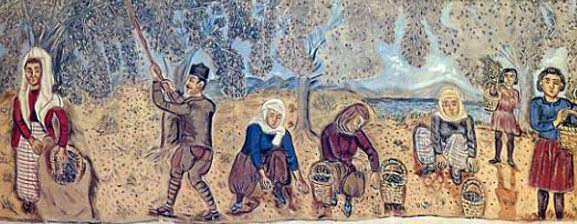
A friend who died a few years ago told me that “in the old days” there were no nets. The women and the children had to pick the olives up from the ground, often cutting their hands on thorns and stones. The nets are a Goddess-send. Between harvests, the nets are simply folded up and placed in the crotch of the tree. Here no one steals them.
In the fields where I walk some of the trees have enormous trunks. Some of them have two trunks, growing like sisters. Many of them are 300, some perhaps 500, years old. A man emerges from a field that has some particularly old trees. I ask him how old they are. “Older than I am,” he replies. “They were here before I was born. They will be here after I die.”
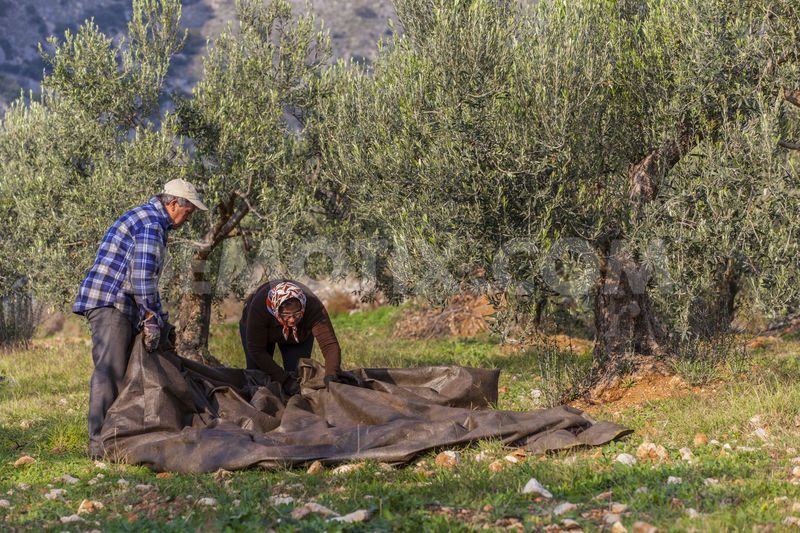
Here the olive harvest is not mechanized, so even with tractors, cars, and nets, old rhythms continue.
The trees bear. The olives are harvested in winter. Oil is produced, stored, and sold. Some olives are blanched with salt for weeks. In the late winter, the trees are pruned. The trees are kept low enough to manage. The sun must reach the olives, so the trees are thinned so that the light shimmers through them. This is why they look so beautiful in the wind. In the spring the trees flower. All summer long the fruit ripens and the olives grow larger. Just as the olives begin to fall from the trees, the harvest begins again.
Olives have been cultivated for at least 6000 years, from at least the middle of the Neolithic period. Evidence of the most ancient olive cultivation is found in Syria, Palestine, and Crete. It is likely that women were the first to pick and discover how to preserve wild olives. Why? Because women were the gatherers, and they were ones who prepared the food they gathered. Thus it is likely that women first cultivated the olive, and that they chose the varieties that were cultivated.
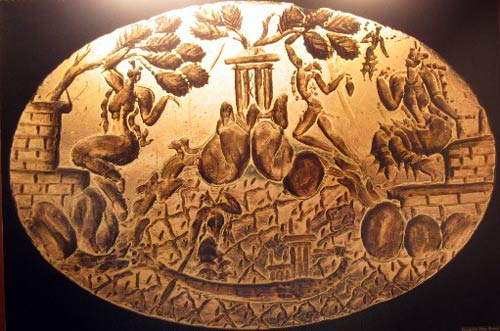
The olive is known as the immortal tree. This is because shoots are always springing up from its roots. Even when it is cut down, it will grow again. No wonder the olive cycle was once considered sacred and the olive tree a holy tree.
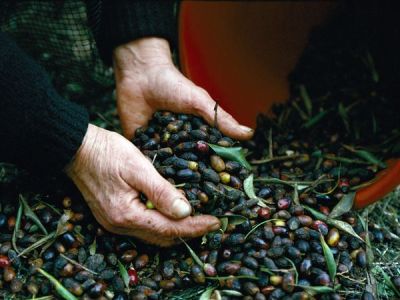
As I walk through the fields I like to think of people harvesting fruit from trees passed down from generation to generation. I try to imagine what it would feel like to pick olives from the same trees that my grandmother’s grandmother harvested. I imagine feeling firmly rooted in the tradition of the olive harvest, knowing that my grandmothers were here before me, and my children and grandchildren will come after me. My knowledge and appreciation of it is one of the ways I have become Greek.
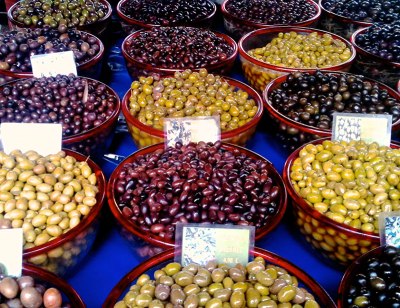
In Greece there are many different kinds of olive trees, many different kinds of olives, and many different colors and flavors of oil. In Kalamata they say that the best olive oil is thick and green. Here in Lesbos, our olive oil is light and golden, with a slight flavor of nuts. In Crete they preserve tiny olives, the size of two peas. In Lesbos, our local olives are larger, black, and when preserved wrinkled. In each area of Greece the olive trees have been nurtured and selected. They are resistant to disease, and they don’t need to be watered. The locals say they bear a heavy crop every other year.
In Crete, the European Union has encouraged people to uproot their olive groves to replant them with higher yield trees. The new trees need to be watered. Already this process has lowered the water table. In the European Union they say there is a glut of olive oil on the international market.
Olive oil is the healthy oil. It not only does not create “bad cholesterol,” it creates “good cholesterol.” What if olive oil were used as the common oil around the world the way it is here in Greece? Food would taste better, people would be healthier, and the olive harvest would be profitable.
In America olive oil is a luxury. Americans pay top dollar for small bottles of Italian olive oil. They don’t even know that much of the Italian oil they buy was harvested in Greece. Here in Lesbos our farmers sell their oil for 3 euros a liter. Some don’t even bother to harvest their trees because there is so little profit. There is something wrong with this picture.
Carol P. Christ has recently returned from the fall Goddess Pilgrimage to Crete which she led through Ariadne Institute. It is not too early to sign up for the spring or fall pilgrimages for 2014. Carol can be heard on a WATER Teleconference. Carol’s books include She Who Changes and Rebirth of the Goddess and the widely-used anthologies Womanspirit Rising and Weaving the Visions.


Thanks for this insightful article.
It is interesting that the olive tree has a spiritual meaning in many religions, including Islam. (I’m a Muslim, so that interests me the most)
Sura (chapter) 95 of the Quran begins with: “By the fig and the olive tree”, so basically God swears by the olive tree.
And a saying of the Prophet Muhammad (peace be upon him) says: “Put olive oil on your skins and in your hair, for olive oil comes from a blessed tree.”
The remark about the blessed tree, might be an allusion to this verse: “24.35. God is the Light of the heavens and the earth. The example of His Light is like a niche wherein is a lamp; the lamp is in a crystal, and the crystal, shining as if a pearl-like radiant star, LIT FROM THE OIL OF A BLESSED OLIVE TREE that is neither of the east nor of the west. The oil would almost give light of itself though no fire touches it. Light upon light! God guides to His Light whom He wills. God strikes parables for people. God has full knowledge of all things.”
LikeLike
Interesting how religious symbols persevere in new contexts.
LikeLike
Carol, you’ve answered some questions and taught me so much in this post. Olive trees are also sacred emblems of Demeter. In the Hymn to Demeter when she incarnates as an old woman, she arrives at the Maiden’s Well, and sits down under an olive tree. None of the readings I’ve done has turned up the answer as to why an olive tree though? Today here at Feminism and Religion, I get the idea, it is to identify even her incarnation in old age with the fruits of nature, since the olive trees have such incredible longevity, and even immortality. The line where Demeter sits down under the tree is marvelously interesting in the context of your olive post too, because it sets the two images directly together (Lines 100-101).
“She sat near the way[side]…in a shady place over which grew an olive tree, an old woman, ancient-born.”
So the double meaning there, those trees, sacred to the goddess, are all ancient women too. And how about another important lady, ancient born, and still bearing fruit, the anonymous author of the hymn (or some say, Sappho?), quite magically.
LikeLike
Thanks I had not remembered that detail, which surely is significant.
LikeLike
Another take on the holy olive tree based on the work of Rabbi Arthur Waskow: A few days ago, on Shabbat Hanukkah, the Jewish supplemental reading (“haftarah”) was from the Biblical book of the prophet Zechariah. Apparently inspired by a description that appears twice, in Exodus 25 and Exodus 37, of the requirement for building the portable shrine, the Mishkan, Zechariah envisions a lampstand/menorah of the future. Like the one from Exodus it is made of gold with a bowl on top and seven lamps connected to seven pipes. Then he adds a new detail, two olive trees, one on either side of the bowl (4:2-3) that are feeding the oil directly into it (4:11-13).
R. Waskow continues: “No human being needs to press the olives, collect the oil, clarify and sanctify it. The trees alone can do it all. . . Is the Menorah the work of human hands, or itself the fruit of a tree? [It] might be called a “cyborg,” a cybernetic organism that is woven from the fruitfulness both of “adamah” (an earthy sprouting from the humus-soil) and “adam” (a human earthling).”
He goes on to compare olive oil, a growable, replaceable, sustainable source of light to coal, oil, and frackable unnatural gas, and ends with a strong environmental message.
https://theshalomcenter.org/content/prophetic-green-menorah-tree-light
LikeLike
Another interesting survival of symbolism and an interesting ecological midrash. Thanks.
LikeLike
Here in Nice, on the French Mediterranean coast, olives have already been harvested. They are little and black, and we are several to put them in water and salt to have our own food, now they are almost ready to be eaten.
LikeLike
Blessed be.
LikeLike
Beautiful post! May your voice be heard!
LikeLike
Would that the European Community listened to its own environmental experts. Then they would not be giving money to uproot trees suited to native environments in the name of profit which in the end will be illusory.
And no there is no glut of olive oil on the market. We just need to figure out how to market it and to stop promoting less healthy oils.
LikeLike
By the way, the olive tree is also a VERY important, almost sacred symbol within Palestinian culture.
People have a deep connection with the trees, who also have existed for ages. The trees are their livelihood, their love, their pride.
That’s why Palestinians are so sad and angry when their trees are uprooted by settlers or the Israeli army: They are both their livelihood as their pride and love.
LikeLike
That thought occurred to me over the weekend too. Not only are trees being uprooted which is part of sustenance economy, but whole webs of connection with ancestors going back to the Neolithic are being destroyed. When will we ever learn?
LikeLike
True! That’s why every age needs prophets, teachers and sages to repeat & emphasize age-old wisdoms. Sadly, mankind does not learn from history.
LikeLike
Or perhaps what we need is to treasure ancestral wisdom and to share it with those who have lost it.
LikeLike
What do you consider “ancestral wisdom”?
My ancestors (Mostly West-African enslaved people) probably aren’t the same as yours AND there were ancestors of every possible ethnic and religious affiliation.
So could you be more specicific?
LikeLike
In the sense I meant it here, I meant the wisdom of those who live close to the land as in the olive harvest but not limited to it. I was also thinking of the 13 Native American Grandmothers who have chosen to transmit their ancestral wisdom to non-Indians, who may not have their own sources of land-based ancestral wisdom.
I guess–to be honest–I may also have been reacting against the idea that only a “prophet” or a “guru” or some other form of special divinely chosen individual can transmit the insights we need for our time or any time.
LikeLike
Reblogged this on She Who Is.
LikeLike